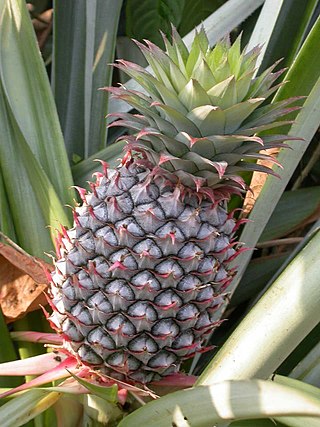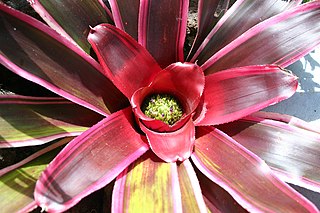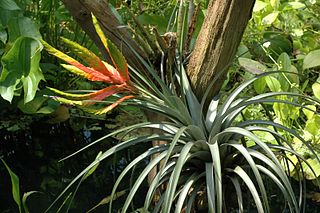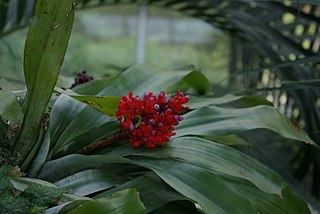
The Bromeliaceae are a family of monocot flowering plants of about 80 genera and 3700 known species, native mainly to the tropical Americas, with several species found in the American subtropics and one in tropical west Africa, Pitcairnia feliciana.

Neoregelia is a genus of epiphytic flowering plants in the family Bromeliaceae, subfamily Bromelioideae, native to South American rainforests. The genus name is for Eduard August von Regel, Director of St. Petersburg Botanic Gardens in Russia (1875–1892).

Werauhia is a genus of the botanical family Bromeliaceae, subfamily Tillandsioideae. The genus is named for Werner Rauh, a German botanist (1913–2000). Based on molecular evidence, a number of species previously classified within other bromeliad genera, especially Vriesea and Tillandsia, have been placed in Werauhia instead. Species in this genus are distributed across tropical regions in the Americas.

Vriesea is a genus of flowering plants in the botanical family Bromeliaceae, subfamily Tillandsioideae. The genus name is for Willem Hendrik de Vriese, Dutch botanist, physician (1806–1862). Its species are widespread over Mexico, Central America, South America and the West Indies.

Cryptanthus is a genus of flowering plants in the family Bromeliaceae, subfamily Bromelioideae. The genus name is from the Greek cryptos (hidden) and anthos (flower). The genus formerly had two recognized subgenera: the type subgenus and subgenus HoplocryptanthusMez which has been raised to the separate genus Hoplocryptanthus. All species of this genus are endemic to Brazil. The common name for any Cryptanthus is "Earth star".

Tillandsioideae is a subfamily of plants in the bromeliad family Bromeliaceae. This subfamily contains the greatest number of species. Most are epiphytic or lithophytic, growing in trees or on rocks where they absorb water and nutrients from the air. Spanish moss of the genus Tillandsia is a well-known species. Bromeliads in the genera Guzmania and Vriesea are the more commonly cultivated members of this subfamily.

Pitcairnia is a genus of plants in the family Bromeliaceae, subfamily Pitcairnioideae. It was named for William Pitcairn, Scottish physician and gardener (1711–1791). The genus Pitcairnia ranks as the second most prolific of the bromeliad family. They are most abundant in Colombia, Peru and Brazil, but can also be found in areas from Cuba and Mexico south to Argentina. One species, Pitcairnia feliciana, is found in tropical West Africa and is the only member of the family Bromeliaceae not native to the Americas.

Greigia is a genus of plants in the family Bromeliaceae, subfamily Bromelioideae. It is native to Latin America from Mexico to Chile. The genus is named in honour of Major General Samuel Alexjewitsch Greig, president of the Russian Horticultural Society in 1865.

Ronnbergia is a genus in the plant family Bromeliaceae, subfamily Bromelioideae. Native to South and Central America, this genus was named for Auguste Ronnberg, Belgian Director of Agriculture and Horticulture in 1874.

Gregbrownia fulgens, synonym Mezobromelia fulgens, is a species of flowering plant in the family Bromeliaceae. It is endemic to Ecuador. It grows in the páramo and high-elevation forest of the Andes. It is terrestrial or grows as an epiphyte.

Lamprococcus is a subgenus of the genus Aechmea.
Mezobromelia bicolor is a plant species in the family Bromeliaceae. This species is native to Ecuador and Colombia.
Mezobromelia pleiosticha is a species of flowering plant in the family Bromeliaceae. This species is native to northwestern South America.
Josemania truncata is a species of flowering plant in the family Bromeliaceae, native to Colombia and Ecuador. It was first described by Lyman Bradford Smith in 1954 as Tillandsia truncata. Plants of the World Online sinks the genus Josemania into Cipuropsis, treating this species as Cipuropsis truncata.
Cipuropsis is a genus of flowering plant in the family Bromeliaceae, native to the Caribbean, southern Central America and northwestern South America. The genus was first described by Ule in 1907.

Gregbrownia is a genus of flowering plants belonging to the family Bromeliaceae.

Tillandsia subg. Pseudovriesea is a subgenus of the genus Tillandsia.
Mezobromelia hospitalis, synonym Cipuropsis hospitalis, is a species of flowering plant in the family Bromeliaceae, native to Colombia. It was first described by Lyman Bradford Smith in 1948 as Tillandsia hospitalis.
Mezobromelia magdalenae, synonym Cipuropsis magdalenae, is a species of flowering plant in the family Bromeliaceae, native to Colombia. It was first described by Lyman Bradford Smith in 1963 as Vriesea magdalenae.
Gregbrownia hutchisonii is a species of flowering plant in the family Bromeliaceae, native to northern Peru. It was first described by Lyman Bradford Smith in 1966 as Tillandsia hutchisonii.












